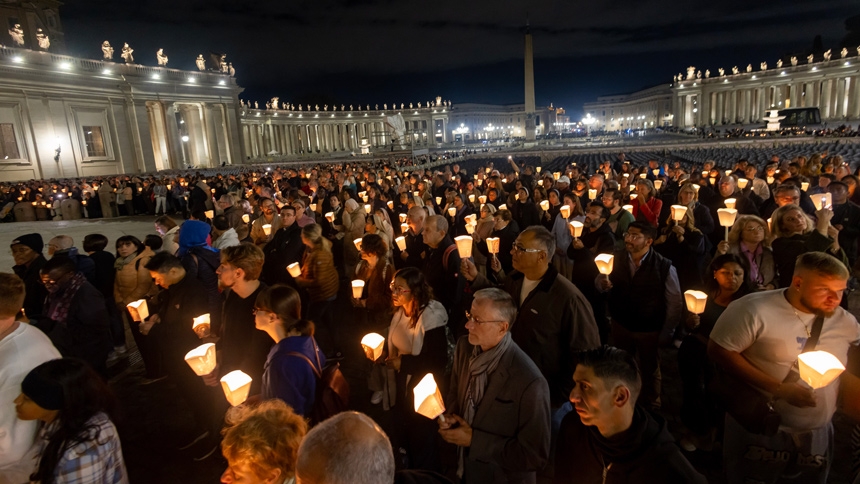
Above: Pilgrims, including religious sisters, priests and laypeople who serve as missionaries around the world, recite the rosary in St. Peter's Square at the Vatican Oct. 4, 2025, as part of the Jubilee of the Missions. (CNS photo/Pablo Esparza)
VATICAN CITY (CNS) -- Sharing the Gospel with one's neighbor, welcoming migrants who are Christian or setting off to a foreign land to share God's love through charity and proclamation are concrete expressions of belief that the church is "catholic" and that God wants to save all people, said Cardinal Luis Antonio Tagle.
The Catholic Church's missionary activity "clearly manifests both the universality of salvation and the catholicity of the church," the cardinal, pro-prefect of the Dicastery for Evangelization, told hundreds of missionaries from dozens of nations.
In a lecture hall filled with religious sisters, priests and lay missionaries, including some with their small children, the cardinal kicked off the World Missionary Meeting Oct. 4 as part of the Jubilee of the Missions.
The Jubilee celebration, held on the same weekend as the Jubilee of Migrants, included a nighttime "missionary rosary" procession in St. Peter's Square Oct. 4, Mass with Pope Leo XIV Oct. 5 and participation that evening in the "Festival of Peoples," a celebration of song, dance and testimonies on the theme "Migrants and Missionaries of Hope Among the Peoples."
Cardinal Tagle told the missionaries that "when we speak of the Catholicity of the church as related to the universality of mission, we are not dealing with a mere concept or romantic ideal."
The communion of the Catholic Church, he said, is meant to be "a concrete Catholicity, involving concrete peoples -- living in real cultures with their own histories, glories, strengths, failures and limitations -- yet united in one faith."
People's appreciation for their countries and cultures seems to be growing, he said, and that is "a grace."
"But we are not blind to the ideological tendency to assert the uniqueness of one people in opposition to others," he said. "Diversity becomes a cause of division, not of mutual enrichment."
"Being 'local' can lead to isolation," which is anti-catholic if it infects local churches, he said. Unfortunately, "sometimes ethnicity, caste or national identity have more power than the Gospel of universal love and fraternity."
"No local church can separate itself from others out of false superiority or false inferiority," Cardinal Tagle said. "All cultures need to be purified and aligned with the Gospel of Jesus through docility to the Spirit."
While the church is essentially missionary and every baptized person is called to share the Gospel, he said, "we are quick to complain about the lack of vocations, but slow to see" the new missionaries who are carrying the Gospel to new lands or whose faith is reviving the church in traditionally Christian countries.
"There are millions of migrants, many of them Christians, seeking safer and more peaceful lives," he said, pointing to the example of the thousands of Filipino and other Catholic migrant workers living their faith as they work in the United Arab Emirates.
Cardinal Giorgio Marengo, the apostolic prefect of Ulaanbaatar, Mongolia, described missionary activity using a phrase coined by retired Archbishop Thomas Menamparampil of Guwahati, India, who said missionary activity is "whispering the Gospel."
"To whisper the Gospel involves the depth, the complexity and the beauty of mission, especially that of the first proclamation" of God's love and of salvation in Jesus Christ, Cardinal Marengo said.
"The mission of the church is always and everywhere to offer to every person the possibility to know Christ and his Gospel," he said. "This treasure is destined for the heart, that is, the deepest, most mysterious part of the person. That is why one whispers; it is a delicate action, it requires trust, and it presupposes a relationship of sincere friendship."
Mission is not about "winning converts" or changing local cultures or dominating communities, he said. It is a result of love for God that overflows to love for all the people God created.
That love, the cardinal said, is full of respect for the dignity of the person and the richness of his or her culture, which a missionary must know.
"Whispering the Gospel to the heart of a culture encourages a discreet evangelization attentive to details, in the awareness that its dynamism is one of attraction rather than proselytism," he said.

